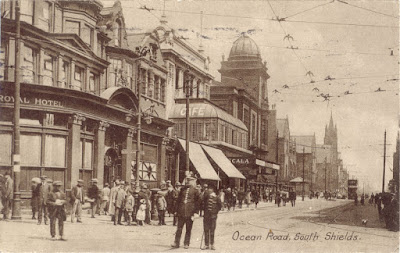Part 2 of the Bygone Days of the Tyne as published in the Shields Gazette (date unknown). Geordie continues to wax lyrical about the old sailor spirit and describes the scene on the Ocean Road.
 |
| Ocean Road in 1923 |
--
Call of the Sea
“There
was no such thing as signing ‘sailor’ and getting an A.B.’s pay. No, they had
such a tough time for a year or two – sure thing – Anyhow, go to sea they
would, even if they started as the cabin boy, messroom ‘fat’ or deck-boy.
“When
a few of them boys met at home, well, it was – “Clear out you small swells and
make room for the big sea’ –
“Down
Ocean Road they went arm in arm, and with no policeman in sight they probably
sang “No more I’ll go aroving” – keeping in mind the order at starting ‘Now
then boys, all roll together’.
“I
can see them now, each rigged out with a ‘Second mate’s bad discharge’; a
bright leather peaked cap, its strap pulled over the top – worn cock-billed on
three hairs.
“Those
with square cut jacket, over their guernseys, back silk mufflers round their
necks – the knots canted to port shoulders, were the schoonermen.
“The ‘Yanks’ wore no waistcoat, so as to expose a fancy
shirt bought in the ‘States’ and a flowing tie. Of course those guys kept their
pants up with the aid of a nice buckled belt.
“The
messroom fats – regular sea swells – wore linen collars and flash white silk
mufflers, the ends tucked in their vests well down.
Looking the Part
“Pants
were semi-bell-bottomed and shoes high heeled, though it the weather was wet
Wellington sea boots were the fashion. Oh, they dressed sailor and were proud
of it. Nowadays you can’t tell a sailor from an insurance collector.
“Leaving
the ‘bob’ side of the road they would invade the ‘two shilling side’ where they
swanks fancied they held right-of-way; I mean the sailing ship apprentice in
his smart uniform; the Brassbounder he was called, and between you and me he
was far too successful with the lasses to please the ‘locals’.
“However
they tried to get their own back by a scornfully uttered ‘Light the binnacle
boy.’ Rivals in love, both parties had a sneaking regards for one another.
Really the locals had great respect for the brass-buttoned sailing ship
apprentice, who might – if he hadn’t been a young sport – bring up ‘all
standing’ some of them, perhaps truthfully with the paralysing phrase then
still in use ‘Steamboat sailor!’
“Steamboat
sailor or not the spirit was there, and although some of the locals became
skippers, I know their greatest pride is in the name of sailor. Even those that
became cooks and stewards, firemen or donkeymen as fortune willed, were at
heart and will remain while they last – sailors."
No comments:
Post a Comment